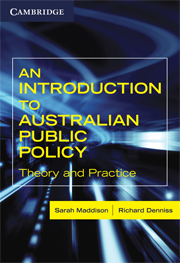Book contents
- Frontmatter
- Contents
- List of figures
- List of tables
- List of case studies exercises, and original contributions
- Foreword
- PART 1 Policy and theory
- Introduction
- 1 The australian policy context
- 2 State or market I: Ideology and public policy
- 3 State or market II: The economics of public policy
- 4 Models and theory for understanding policy
- 5 Policy actors and policy instruments
- 6 Identifying issues: Agenda setting and policy discourse
- PART 2 Policy in practice
- References
- Index
- References
2 - State or market I: Ideology and public policy
- Frontmatter
- Contents
- List of figures
- List of tables
- List of case studies exercises, and original contributions
- Foreword
- PART 1 Policy and theory
- Introduction
- 1 The australian policy context
- 2 State or market I: Ideology and public policy
- 3 State or market II: The economics of public policy
- 4 Models and theory for understanding policy
- 5 Policy actors and policy instruments
- 6 Identifying issues: Agenda setting and policy discourse
- PART 2 Policy in practice
- References
- Index
- References
Summary
In the introduction to this book we posed what we consider to be the central question that informs the way we think about public policy: What is the role of the state in people's lives? This chapter will consider this question from a range of different ideological perspectives; from the ‘invisible hand’ of Adam Smith to the central control of Marx. Understanding the way that different ideological perspectives might shape the answer to this key question will help you to develop a richer and more sophisticated understanding of policy work. If we ‘unpack’ this central question we find other questions that we need to think about, such as:
What is the appropriate role of government?
How much should governments intervene in the market?
How much should governments intervene in the lives of citizens?
The way in which any individual, group or political party will answer these questions will depend, at least in part, on their ideological perspective.
Ideology, in the sense that we are using it here, refers to a set of ideas or beliefs that underpins a social, economic or political system. An ideology is the worldview that allows an individual or a group both to interpret the way things are and to suggest the way things ought to be. They are ‘guides to political action’ that give us ‘ideals to believe in, goals to strive for and tell for what causes to fight’ (Adams 1993: 6).
- Type
- Chapter
- Information
- An Introduction to Australian Public PolicyTheory and Practice, pp. 39 - 56Publisher: Cambridge University PressPrint publication year: 2009



